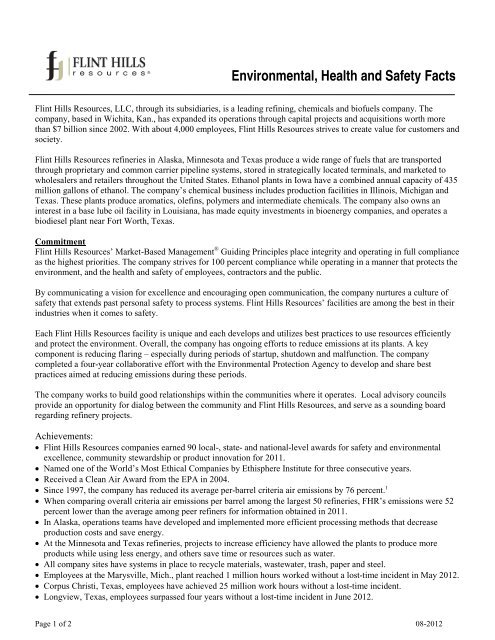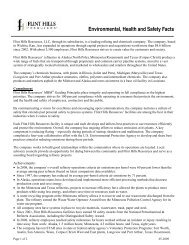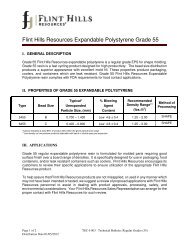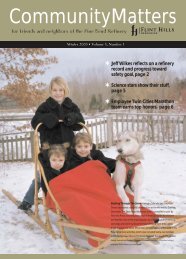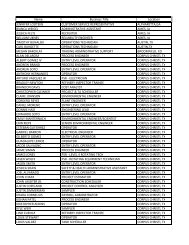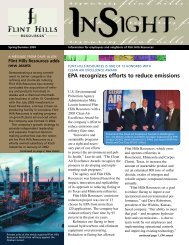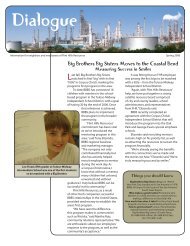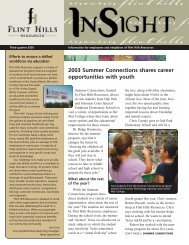Front Page -- fhr - Flint Hills Resources
Front Page -- fhr - Flint Hills Resources
Front Page -- fhr - Flint Hills Resources
You also want an ePaper? Increase the reach of your titles
YUMPU automatically turns print PDFs into web optimized ePapers that Google loves.
Environmental, Health and Safety Facts<br />
<strong>Flint</strong> <strong>Hills</strong> <strong>Resources</strong>, LLC, through its subsidiaries, is a leading refining, chemicals and biofuels company. The<br />
company, based in Wichita, Kan., has expanded its operations through capital projects and acquisitions worth more<br />
than $7 billion since 2002. With about 4,000 employees, <strong>Flint</strong> <strong>Hills</strong> <strong>Resources</strong> strives to create value for customers and<br />
society.<br />
<strong>Flint</strong> <strong>Hills</strong> <strong>Resources</strong> refineries in Alaska, Minnesota and Texas produce a wide range of fuels that are transported<br />
through proprietary and common carrier pipeline systems, stored in strategically located terminals, and marketed to<br />
wholesalers and retailers throughout the United States. Ethanol plants in Iowa have a combined annual capacity of 435<br />
million gallons of ethanol. The company’s chemical business includes production facilities in Illinois, Michigan and<br />
Texas. These plants produce aromatics, olefins, polymers and intermediate chemicals. The company also owns an<br />
interest in a base lube oil facility in Louisiana, has made equity investments in bioenergy companies, and operates a<br />
biodiesel plant near Fort Worth, Texas.<br />
Commitment<br />
<strong>Flint</strong> <strong>Hills</strong> <strong>Resources</strong>’ Market-Based Management ® Guiding Principles place integrity and operating in full compliance<br />
as the highest priorities. The company strives for 100 percent compliance while operating in a manner that protects the<br />
environment, and the health and safety of employees, contractors and the public.<br />
By communicating a vision for excellence and encouraging open communication, the company nurtures a culture of<br />
safety that extends past personal safety to process systems. <strong>Flint</strong> <strong>Hills</strong> <strong>Resources</strong>’ facilities are among the best in their<br />
industries when it comes to safety.<br />
Each <strong>Flint</strong> <strong>Hills</strong> <strong>Resources</strong> facility is unique and each develops and utilizes best practices to use resources efficiently<br />
and protect the environment. Overall, the company has ongoing efforts to reduce emissions at its plants. A key<br />
component is reducing flaring – especially during periods of startup, shutdown and malfunction. The company<br />
completed a four-year collaborative effort with the Environmental Protection Agency to develop and share best<br />
practices aimed at reducing emissions during these periods.<br />
The company works to build good relationships within the communities where it operates. Local advisory councils<br />
provide an opportunity for dialog between the community and <strong>Flint</strong> <strong>Hills</strong> <strong>Resources</strong>, and serve as a sounding board<br />
regarding refinery projects.<br />
Achievements:<br />
• <strong>Flint</strong> <strong>Hills</strong> <strong>Resources</strong> companies earned 90 local-, state- and national-level awards for safety and environmental<br />
excellence, community stewardship or product innovation for 2011.<br />
• Named one of the World’s Most Ethical Companies by Ethisphere Institute for three consecutive years.<br />
• Received a Clean Air Award from the EPA in 2004.<br />
• Since 1997, the company has reduced its average per-barrel criteria air emissions by 76 percent. 1<br />
• When comparing overall criteria air emissions per barrel among the largest 50 refineries, FHR’s emissions were 52<br />
percent lower than the average among peer refiners for information obtained in 2011.<br />
• In Alaska, operations teams have developed and implemented more efficient processing methods that decrease<br />
production costs and save energy.<br />
• At the Minnesota and Texas refineries, projects to increase efficiency have allowed the plants to produce more<br />
products while using less energy, and others save time or resources such as water.<br />
• All company sites have systems in place to recycle materials, wastewater, trash, paper and steel.<br />
• Employees at the Marysville, Mich., plant reached 1 million hours worked without a lost-time incident in May 2012.<br />
• Corpus Christi, Texas, employees have achieved 25 million work hours without a lost-time incident.<br />
• Longview, Texas, employees surpassed four years without a lost-time incident in June 2012.<br />
<strong>Page</strong> 1 of 2 08-2012
• The terminals group received the Safety Excellence Award from the International Liquid Terminals Association for<br />
two consecutive years. The group received the Platinum Safety Award from the ILTA, its highest honor, in 2010 and<br />
2008.<br />
• Twenty-six fuels and asphalt terminals received the Occupational Excellence Achievement Award and the<br />
Occupational Perfect Record Award from the National Safety Council for performance during 2011.<br />
• The Minnesota refinery has earned the Minnesota Safety Council’s highest safety award, the Award of Honor, for<br />
three consecutive years. It has also earned the Outstanding Achievement Award.<br />
• The company has 13 STAR certified sites in state or federal safety agency’s Voluntary Protection Programs,<br />
including the first in the fuels terminals industry to be honored. The Minnesota refinery has been MNSTAR certified<br />
by the Minnesota Department of Labor and Industry since 2005.<br />
• The company has developed systems to track process safety performance and has contributed to industry and<br />
regulatory agency discussions on ways to improve performance and develop standards.<br />
• Wildlife management programs at the Joliet, Ill., Rosemount, Minn., and Corpus Christi, Texas, sites have received<br />
Wildlife Habitat Council certification. Both the Joliet and Corpus Christi sites have also received Corporate Lands<br />
for Learning certification from WHC.<br />
Leadership Contact<br />
Brad Razook, president & CEO Mark Nichols, vice president, public affairs and government affairs<br />
316-828-5274<br />
For more information, visit www.<strong>fhr</strong>.com<br />
1 Emissions data calculated using publically available data from state or federal environmental departments.<br />
<strong>Page</strong> 2 of 2 08-2012


